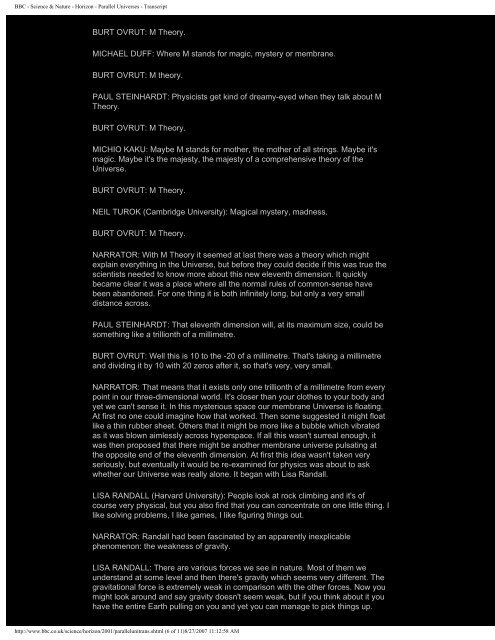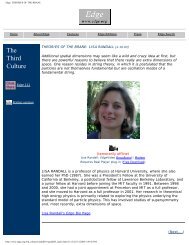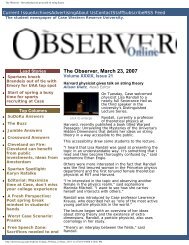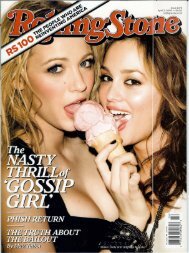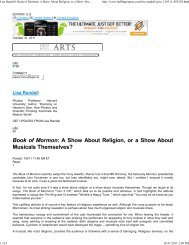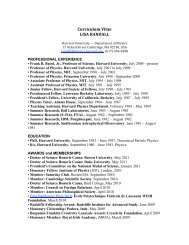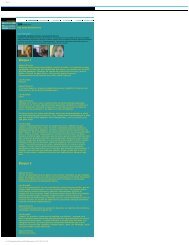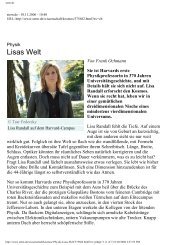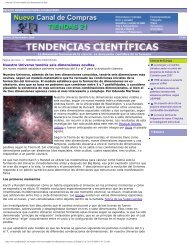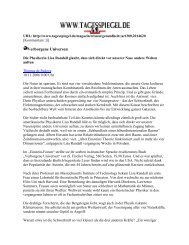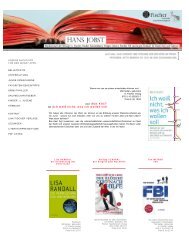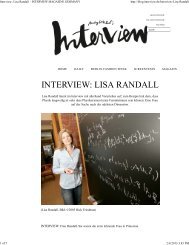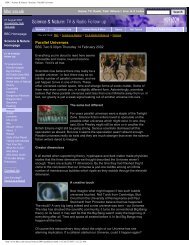BBC - Science & Nature - Horizon - Parallel Universes - Transcript
BBC - Science & Nature - Horizon - Parallel Universes - Transcript
BBC - Science & Nature - Horizon - Parallel Universes - Transcript
- No tags were found...
You also want an ePaper? Increase the reach of your titles
YUMPU automatically turns print PDFs into web optimized ePapers that Google loves.
<strong>BBC</strong> - <strong>Science</strong> & <strong>Nature</strong> - <strong>Horizon</strong> - <strong>Parallel</strong> <strong>Universes</strong> - <strong>Transcript</strong>BURT OVRUT: M Theory.MICHAEL DUFF: Where M stands for magic, mystery or membrane.BURT OVRUT: M theory.PAUL STEINHARDT: Physicists get kind of dreamy-eyed when they talk about MTheory.BURT OVRUT: M Theory.MICHIO KAKU: Maybe M stands for mother, the mother of all strings. Maybe it'smagic. Maybe it's the majesty, the majesty of a comprehensive theory of theUniverse.BURT OVRUT: M Theory.NEIL TUROK (Cambridge University): Magical mystery, madness.BURT OVRUT: M Theory.NARRATOR: With M Theory it seemed at last there was a theory which mightexplain everything in the Universe, but before they could decide if this was true thescientists needed to know more about this new eleventh dimension. It quicklybecame clear it was a place where all the normal rules of common-sense havebeen abandoned. For one thing it is both infinitely long, but only a very smalldistance across.PAUL STEINHARDT: That eleventh dimension will, at its maximum size, could besomething like a trillionth of a millimetre.BURT OVRUT: Well this is 10 to the -20 of a millimetre. That's taking a millimetreand dividing it by 10 with 20 zeros after it, so that's very, very small.NARRATOR: That means that it exists only one trillionth of a millimetre from everypoint in our three-dimensional world. It's closer than your clothes to your body andyet we can't sense it. In this mysterious space our membrane Universe is floating.At first no one could imagine how that worked. Then some suggested it might floatlike a thin rubber sheet. Others that it might be more like a bubble which vibratedas it was blown aimlessly across hyperspace. If all this wasn't surreal enough, itwas then proposed that there might be another membrane universe pulsating atthe opposite end of the eleventh dimension. At first this idea wasn't taken veryseriously, but eventually it would be re-examined for physics was about to askwhether our Universe was really alone. It began with Lisa Randall.LISA RANDALL (Harvard University): People look at rock climbing and it's ofcourse very physical, but you also find that you can concentrate on one little thing. Ilike solving problems, I like games, I like figuring things out.NARRATOR: Randall had been fascinated by an apparently inexplicablephenomenon: the weakness of gravity.LISA RANDALL: There are various forces we see in nature. Most of them weunderstand at some level and then there's gravity which seems very different. Thegravitational force is extremely weak in comparison with the other forces. Now youmight look around and say gravity doesn't seem weak, but if you think about it youhave the entire Earth pulling on you and yet you can manage to pick things up.http://www.bbc.co.uk/science/horizon/2001/parallelunitrans.shtml (6 of 11)8/27/2007 11:12:58 AM


